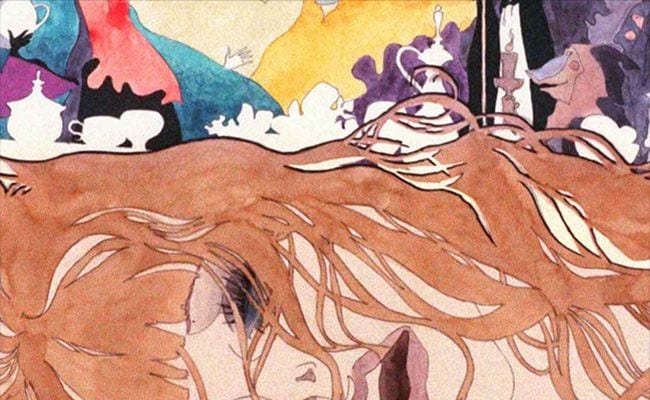What do teenage vampires in Communist Poland and obscure Japanese psychedelic animated erotica have in common? The answer is simple: they’re the two films kicking off the annual Boston Underground Film Festival (BUFF) that returns to the historic Brattle Theater on 23 March. With its return comes a new slate of odd, overlooked films for niche audiences to delight in, and fans of the festival in previous years will no doubt be sated with the offerings of the festival’s latest iteration.
The films featured this year span genres, challenge convention, and look very, very entertaining. With so many features (and very many shorts) programmed this year, I felt it would be worth taking a look at the films that should be on the cinephile-with-a-taste-for-the-obscure’s list of films to watch for.

Belladonna of Sadness (1973, dir. Eiichi Yamamoto) (23 March, 9:30PM)
This Japanese oddity is not a recent film, but it certainly sounds like something one hasn’t seen before. Described as “[a] mad, swirling, psychedelic light-show of medieval tarot-card imagery with horned demons, haunted forests and La Belle Dame Sans Merci, equal parts J.R.R. Tolkien and gorgeous, explicit Gustav Klimt-influenced eroticism” by its fledgling distributor, Cineliciouspics, Belladonna of Sadness seems like the kind of psychedelic surrealism that would be fast friends with films like Fantastic Planet or even the films of Kenneth Anger.

Wendigo (2001, dir. Larry Fessenden) (24 March, 9:45PM)
Larry Fessenden is the New York based director known for his myriad contributions to contemporary horror films. His directorial efforts include No Telling, Habit, The Last Winter, and Wendigo, and are often lauded for their character-driven approach and auteur-like cohesiveness. Wendigo completes the trilogy of films, which includes No Telling and Habit, in that order, described by Fessenden as attempts to update classic horror monsters. With werewolves mostly absent from modern mainstream horror, it seems fair to say that Fessenden’s film will be a refreshing change of pace.

Little Sister (2016, dir. Zach Clark) (25 March, 7:15PM)
Clark’s previous film, White Reindeer, may not have catapulted him into the realm of the ‘mainstream’ independents — Alex Ross Perry, Sean Baker, or Joe Swanberg, for example — but it proved that the young director has a unique vision and a penchant for bleak comedy equal parts cringeworthy and witty. White Reindeer, which follows a young woman’s mourning during the holidays, reveal Clark’s interest in bonds both familial and friendly, middle-class life, and the power of personal rebellion.
Little Sister promises to be similar, with the story centering on a young New York nun returning home to see her brother, a soldier recently returned from the Iraq war. The story promises reconnection devoid of sappy melodrama, and judging from White Reindeer, full of bleak comedy that finds humor in the sad moments many of us would rather avoid.

Chasing Banksy (2015, dir. Frank Henenlotter) (26 March, 7:00PM)
The director of Basket Case returns after a five-year departure from directing with a film that is unlike everything else in his oeuvre. This is no Basket Case, no Frankenhooker. It’s fair to say there’s probably no gore in it. Instead, it’s a caper comedy that follows a street artist as he mounts a heist of a Banksy piece located somewhere in New Orleans. The majority of Henenlotter’s films were horror comedies from the ’80s, so it can’t be overstated that Chasing Banksy is a major departure from the director’s work.

Antibirth (2016, dir. Danny Perez) (26 March, 9:30PM)
The directorial debut of music video director Danny Perez looks like another film in the canon of the neon-drenched ’80s revival; think It Follows, Lost River, or The Guest. Narratively, it concerns a nihilistic young woman named Lou that tries to discover the source of her mysterious pregnancy. However, what seems like a typical “mysterious impregnation” narrative seems to be upended by a mounting psychedelic paranoia. If the warm reception from Sundance is anything to go by, Antibirth is bound to be a unique, wild, and experimental ride.

Rain the Color of Blue With a Little Red in It (2015, dir. Christopher Kirkley) (27 March, 2:00PM)
This Nigerian film is billed as “the West African remake of Purple Rain” and follows a real Nigerian musician (Mdou Moctar) in a fictionalized indie drama about the struggle for musical fame in the Nigerian city of Agadez. The use of the existing template of Prince’s Purple Rain may serve as a valuable, albeit small, contribution to the dialogue surrounding the ongoing globalization of western culture, and its difficult to deny that the film sounds a lot more interesting than most modern remakes or reimaginings. Also of note is that it’s the first fiction film in the Tuareg language, an impressive feat, and one that will hopefully lead to more African cinema being brought to the world stage.
Along with this selection, it should be noted that BUFF features a rich assortment of shorts. Many precede films, although there are also seven engagements that deal exclusively in an hour and a half of short films centering around themes like surrealism, existentialism, and experimental music videos.
These six feature films are wildly different, no doubt about that, but in bringing them together, one discovers a unity, not of theme, but of purpose. The odd, the experimental, and the undervalued are brought together in a festival that offers a respite from the uniformity of modern, mass-market, film. Experiments may not always work, but exposure to such films is valuable precisely because the knowledge of experimentation is the only thing that can reinvent and reinvigorate art forms. Otherwise, it becomes stale, and clearly, the Boston Underground Film Festival wants to avoid that.

